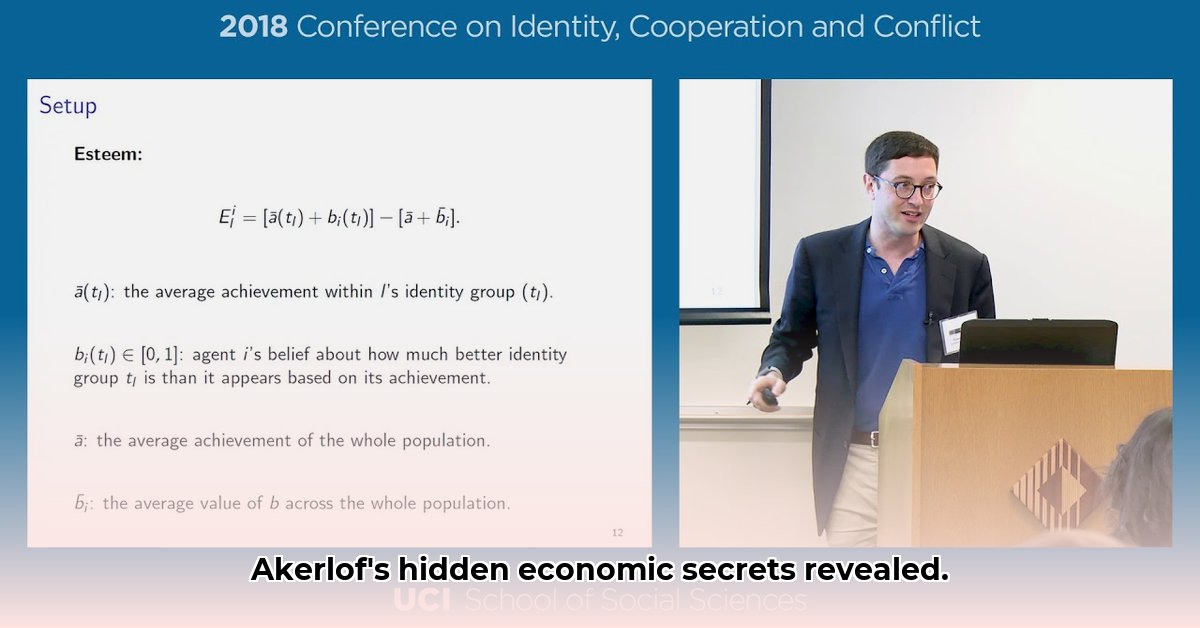
Robert Akerlof: Unraveling the Human Side of Economics
Robert Akerlof's groundbreaking work revolutionized economics by integrating social dynamics and human behavior into economic models, challenging the traditional assumption of perfectly rational actors. Unlike purely mathematical approaches, Akerlof's research illuminates how social factors, such as trust, reputation, and cultural norms, significantly influence economic decisions and market outcomes. This blend of economics and sociology provides a more realistic understanding of how our social lives profoundly intertwine with our financial realities. Isn't it fascinating how these seemingly disparate fields are so deeply connected?
The "Lemons" Problem: Information Asymmetry and Market Failure
Akerlof's most celebrated concept, the "market for lemons," exemplifies information asymmetry—situations where one party possesses more information than another. His seminal paper on used cars illustrates this powerfully. The seller, often knowing more about a vehicle's defects, creates an imbalance. Buyers, unsure whether they're purchasing a "peach" or a "lemon," become hesitant, potentially driving out quality items from the market. This simple example reveals a critical flaw in traditional economic assumptions of perfect information, highlighting the need for transparency and regulation in markets prone to such imbalances. How many other markets are similarly affected by unequal information distribution?
Beyond Used Cars: Social Dynamics in the Workplace and Beyond
Akerlof's influence extends far beyond the used car market. His research delves into the intricate social dynamics within organizations. He demonstrates how company culture, communication styles, and even unspoken norms profoundly impact productivity and success. A positive and inclusive work environment, fostering collaboration and shared goals, proves more crucial than simply hiring the most skilled individuals. This emphasis on the "human element" isn't just beneficial; it's fundamental to a company's economic viability. How can organizations leverage this understanding to foster more productive and engaging workplaces?
The Invisible Hand of Society: Culture's Influence on Economic Decisions
Akerlof’s work also investigates how cultural and social norms shape economic choices. He reveals how deeply ingrained societal rules, varying widely across different cultures, impact saving habits, spending patterns, and risk tolerance. This suggests an "invisible hand" guiding financial decisions, shaped not solely by rational self-interest, but also by deeply rooted cultural influences. How extensively do cultural norms contribute to variations in economic development across the globe?
Group Identity and Economic Behavior: The Power of Belonging
Akerlof’s insightful analysis extends to the influence of group identity on economic behavior. He explores how our sense of belonging, our affiliation with particular social groups, impacts our economic decisions and interactions. This reveals that economic actions are not solely driven by individual rationality but also by a sense of collective identity and social dynamics. How can policymakers leverage this understanding to foster cooperation and reduce economic inequalities?
The Lasting Impact: Why Akerlof Matters Today
Akerlof's contributions have fundamentally reshaped economics, offering valuable insights for policymakers. His work necessitates a move beyond traditional models, integrating social and psychological factors to create more robust and realistic economic policies. This holistic approach recognizes that the economy isn't a separate entity; it's deeply embedded within our social and cultural contexts. His work challenges economists to consider the human element, ensuring that models and policies reflect the richness and complexity of real-world conditions. How might Akerlof’s insights shape future economic models and policy decisions?
How Robert Akerlof's Research Impacts Economic Policy Design
Key Takeaways:
- Akerlof's work challenges traditional economic models based solely on rational actors. His research underscores the profound influence of social factors on economic decision-making. This necessitates incorporating social context into policy design for improved efficacy.
- His insights highlight the critical role of trust, reputation, and social norms in determining economic outcomes. Policies must address these factors to achieve lasting and sustainable impact.
- This understanding directly influences the design of more effective and realistic economic policies. By incorporating social dynamics, policymakers can craft more inclusive and equitable policies.
The Limits of Rationality and the Social Context of Economic Decisions
Akerlof's revolutionary work challenges the traditional economic assumption of perfectly rational actors. His Nobel Prize-winning research on the "market for lemons" exposed the pervasive effects of information asymmetry, where unequal information distribution leads to market failures. This crucial insight demonstrated that ignoring the social context within economic models results in inaccurate and ineffective policies.
Policy Implications: Beyond Rationality
Akerlof's insights have far-reaching consequences for policy design, mandating a shift away from simplistic models based solely on rational self-interest. For instance, financial market regulations must consider trust and transparency, addressing issues of information asymmetry to rebuild confidence following economic crises. Similarly, environmental policies require a nuanced understanding of social norms and community engagement to promote behavioral change beyond simply implementing a carbon price.
From Theory to Practice: Real-World Applications
Akerlof's research is not merely an academic exercise. It directly informs real-world policy interventions. The awareness of the role of social networks in labor markets guides the design of job training programs and initiatives to assist marginalized groups. His emphasis on fostering trust in financial institutions has led to greater transparency regulations, aiming to mitigate information asymmetry and restore market confidence.
Addressing Persistent Market Failures with a New Paradigm
Akerlof’s research provides a framework for addressing deeply rooted economic problems. His focus has fueled new research in behavioral economics, acknowledging deviations from pure rationality in economic decision-making; in social capital, recognizing the value of strong social relationships; and in network effects, understanding how social connections influence economic outcomes. His pioneering work has fundamentally shifted economic thinking and continues to shape policy discourse.